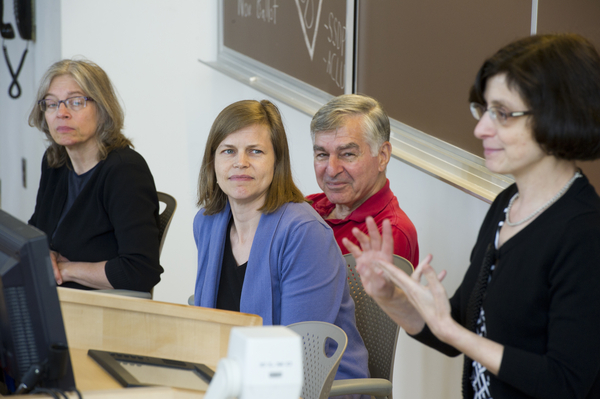Health-care verdict spawns new questions

The Supreme Court ruled last month to uphold the bulk of President Obama’s controversial Affordable Care Act, but the justices’ split decision raises new questions that could redefine the federal government’s relationship with the states.
Northeastern University professors debated the issue on Wednesday afternoon in a panel discussion sponsored by the School of Law Health Law Society.
Faculty members discussed the court’s decision to strike down an expansion of the Medicaid program, which is administered by the states and partially funded with federal money.
“I think it’s a stealth claim because, like the bombers, it went under the radar,” said Wendy Parmet, the associate dean for academic affairs and George J. and Kathleen Waters Matthews Distinguished University Professor of Law. She authored an amicus brief cited in the court’s ruling.
The expansion would have delivered health coverage to Americans whose income was 33 percent above the poverty line, with 90 percent of the funding coming from the federal government. The court ruled that portion of the law was unconstitutional because states risked losing all their Medicaid funding if they did not comply.
“What’s interesting is that this expansion … will be rejected by the states with the highest levels of the uninsured and the weakest Medicaid programs,” Parmet said. “That means a lot of people the Affordable Care Act was going to cover will not get insurance.”
The court’s ruling to disallow the federal government to place strong conditions on the funding it provides to states is a game-changer, panelists said, altering policy going back as far as the New Deal of the 1930s.
“It’s really startling,” said Michael Dukakis, former Massachusetts governor and current Distinguished Professor of Political Science at Northeastern. “This has always been a factor in federal-state grant programs.”
He added, “As someone who has been involved in this area for a long time, I can say this: This is truly weird.”
Even the court’s ruling to uphold the individual mandate caught many off guard. Panelists noted that the decision raises new questions because of the court’s decision to rule on the grounds of the federal government’s ability to levy taxes, not through its powers to regulate commerce.
“[Chief Justice John Roberts] did something that surprised a lot of people by saying it was a valid exercise of the government under the Taxing Clause,” said Kristin Madison, a professor of law with a joint appointment in the Bouvé College of Health Sciences.
Many have suspected that the case’s majority ruling, authored by Chief Roberts, was an attempt to keep the Supreme Court above the partisan fray, especially in an election year. That may not have worked, though, considering that the Court’s popularity is nearing record lows.
“I might have expected the opposite,” said Martha Davis, a professor of law who also authored an amicus brief submitted to the Court. “Chief Justice Roberts’ ruling seemed to try to give something to everyone. It’s a problem when the most respected branch of government has an approval rating under 50 percent and no clear plan of how to turn that around.”





